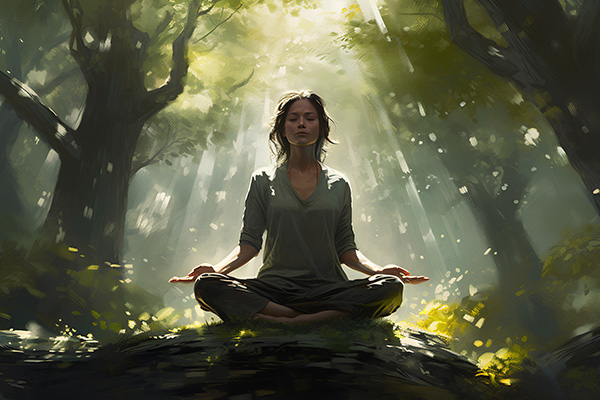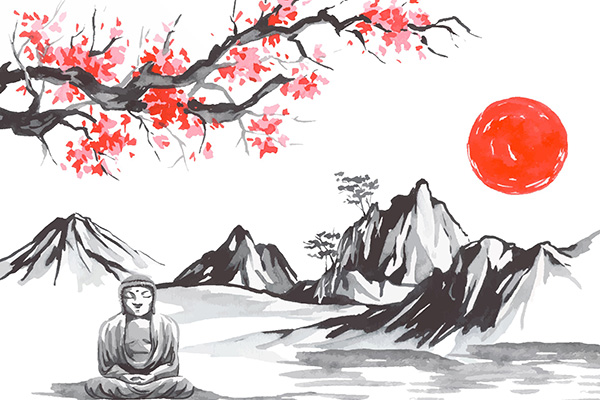presence
Karmic Healing: Can You Handle The Truth?
 In the famous courtroom drama A Few Good Men, Jack Nicholson’s character, Colonel Jessup, exclaims in an iconic movie moment, “You can’t handle the truth!”
In the famous courtroom drama A Few Good Men, Jack Nicholson’s character, Colonel Jessup, exclaims in an iconic movie moment, “You can’t handle the truth!”
I suspect this scene has become legendary in movie history because it resonates so deeply with most people. On some level, many of us sometimes struggle to face the truth about ourselves and our lives.
Whether it’s difficult memories, unhealed wounds, failed relationships, or unspoken regrets, facing our truth can be challenging, even traumatic or overwhelming.
Yet, from a spiritual perspective, facing and owning our truth is one of the most powerful steps we can take on our path to karmic healing and soul growth.
Our soul journey is a karmic balancing act in which the energy we put out into the world eventually comes back to us. When we hide from our truth – whether through denial, justification or avoidance – we accumulate karmic debt.
Like a heavy boulder that we carrry around, karmic debt hinders our soul growth and spiritual progress. On the other hand, when we consciously choose to face our truth, we release this burden and open ourselves to healing, growth, fulfillment and inner peace.
Denial is our most common response to unpleasant truths. We tend to avoid acknowledging aspects of ourselves that we find unattractive, justify our negative behaviors, and make excuses for our bad choices and failures in order to protect our fragile human egos. However, these “untruths” build up over time. By avoiding them, we create layers of illusion that distance us from who we really are and cloud our understanding of our soul purpose and the divine spark within.
Start Living Your Best Life, Today!
 Many years ago, my work took me to the lavishly decorated penthouse of a client who was a retired physician. I remember being in awe of the magnificent collection of books that lined the walls of his home.
Many years ago, my work took me to the lavishly decorated penthouse of a client who was a retired physician. I remember being in awe of the magnificent collection of books that lined the walls of his home.
“Your book collection is truly amazing,” I remember saying as I entered his beautiful home.
“Well, I worked very hard all my life, and one of my little pleasures outside of work was to buy all the books I felt inspired to read. Unfortunately, because I was always so busy and worked very long hours, I had put off reading most of them. But I constantly reminded myself that one day, when I retire, I would read all these wonderful books,” he said. “Unfortunately, it is too late for that now.”
It was too late…because he had tragically gone blind from an illness.
I will never forget that heartbreaking moment, standing in that lovely room lined with some of the most wonderful works of literature ever published. To this day, it reminds me of the importance of doing the things that bring us joy while we can.
The moral of the story is that although the blind doctor did wonderful things for his patients and the medical profession, he didn’t take much time for his own joy and fulfillment in the present moment.
This is why we need to live our lives in the now! Too often we put off our passions because we think there’s always time. But living fully in the present allows us to appreciate each moment, which fuels joy and fulfillment.
The Life Lessons We Learn From Children
 We can learn so much from children if we really pay attention and make the effort to see things from their perspective. Children embody a purity and wisdom that most adults have lost touch with in the complexities of daily life.
We can learn so much from children if we really pay attention and make the effort to see things from their perspective. Children embody a purity and wisdom that most adults have lost touch with in the complexities of daily life.
Many women in my age group, known as the “baby boomers,” were so busy trying to have a career and a family. We believed we could do it all, but in the process we missed many of the little things our children had to teach us. I was guilty of that.
But now that I have grandchildren in my life and have had the opportunity to take the time to see things differently, I have learned many profound lessons and insights from them over the years.
In their early years, children are still deeply connected to their spiritual origins and carry with them a high level of soul awareness that has not yet been clouded by the demands of physical life and the challenges of human existence.
This active spiritual awareness allows them to move through the world with an openness and purity that adults often struggle to maintain. Unencumbered by societal expectations, ego-driven desires, or fear of judgment, they are able to express love, joy, and creativity in their most authentic form.
Because they haven’t yet been conditioned by the limitations and constraints of the material world, children serve as powerful teachers, offering us glimpses of the spiritual truths that are easily forgotten in the hustle and bustle of adult life. They remind us of the infinite potential of our own souls and inspire us to reconnect with the deeper, more meaningful aspects of our being.
Being Present In Your Power
 In my field of work, one becomes acutely aware of the importance of being present in one’s power on a daily basis. Our personal vibration acts as a “passport” to profound spiritual experiences, helping us to access different levels of awareness, psychic perception and self-empowerment.
In my field of work, one becomes acutely aware of the importance of being present in one’s power on a daily basis. Our personal vibration acts as a “passport” to profound spiritual experiences, helping us to access different levels of awareness, psychic perception and self-empowerment.
Our personal vibration is essentially the energy we radiate and attract in return. It shapes our experiences and interactions with the world around us.
A higher vibration is associated with positive feelings, clarity, and a sense of connection to something greater, as well as manifesting abundance, well-being and prosperity. Conversely, a lower vibration can manifest as negativity, confusion, and a sense of disconnection, dysfunction, lack and scarcity.
Raising our vibration involves practices that promote emotional, mental, and spiritual well-being. These practices can include meditation, prayer, visualization, affirmation and other forms of energy work and spiritual self-care.
Over the years, I have explored various techniques to help me be more present in my power. While the specific method is a personal choice, any meditation or mindfulness technique can benefit our well-being and help us find peace in the midst of chaos.
After experimenting with different methods, I have settled on one particular practice that has been working very well for me lately. It is an effortless meditative approach that helps me connect with both my inner world and the realm of spirit.
The Choice To Stay In Your Peace And Joy
 The other day I was sitting in a park surrounded by people. Some were sitting in chairs, looking up at the trees, seemingly in a state of pure relaxation, with no thoughts in their minds, just taking in the nature and sounds around them.
The other day I was sitting in a park surrounded by people. Some were sitting in chairs, looking up at the trees, seemingly in a state of pure relaxation, with no thoughts in their minds, just taking in the nature and sounds around them.
I felt a deep sense of peace and tranquillity, having just meditated before coming to the park. I had spread a blanket under my favourite oak tree with a book in my hand.
I looked around and saw a young family. The children were playing, throwing a ball back and forth, while the father was absorbed in his mobile phone. The mother was busy preparing a picnic, setting the table with a beautiful tablecloth. Eventually they settled down.
On the other side of the park was a lovely play area where families watched their children playing, climbing and jumping.
In the middle of the park, a group of young people were playing volleyball, being quite loud and using foul language. Their behaviour attracted everyone’s attention. The family preparing for the picnic decided to leave, put everything in their cars and drove off. Others sitting in deckchairs and some children in the play area also left.
The noisy volleyball group eventually attracted the attention of a police patrol. I overheard one of the officers reminding them of the ban on alcohol in public parks and urging them to be respectful of others, especially with small children around. Despite the warnings, they remained loud and disrespectful until they finally left.
Using Essential Oils To Enhance Your Psychic Awareness
 Essential oils have many esoteric uses beyond traditional aromatherapy. In fact, many experienced spiritual seekers use essential oils in their daily practices. But what is less well known is that these magical oils can also be used to enhance intuition and promote psychic awareness.
Essential oils have many esoteric uses beyond traditional aromatherapy. In fact, many experienced spiritual seekers use essential oils in their daily practices. But what is less well known is that these magical oils can also be used to enhance intuition and promote psychic awareness.
Aromatic substances also help increase focus and clarity during meditation, divination, energy healing, and psychic reading. By engaging the sense of smell, you can more effectively anchor your awareness in the present moment, reduce distractions, and promote a state of mindfulness or psychic attunement to open your channels of intuition. I also feel more attuned to subtle energies and spirit presences when I use aromatherapy in my psychic work.
Essential oils are a wonderful spiritual tool that promote relaxation, mental clarity and emotional balance, which in turn creates a conducive environment for exploring your intuition and inner awareness.
Smell is closely linked to the limbic system in the brain, which is associated with emotions, memories, and instinctual responses. When we encounter a particular scent, it can evoke strong emotional or subconscious reactions. In spiritual practices, certain scents can trigger deep-seated feelings or associations, helping to create a particular mental or emotional state conducive to psychic experiences.
Overall, the power of scent and aroma in spiritual and esoteric practices is multifaceted, involving a combination of sensory, psychological, cultural, and symbolic factors. Aromas serve as powerful tools for creating sacred spaces, enhancing psychic experiences, and facilitating inner transformation through their profound influence on the mind, body, and spirit.
The Meditative Art Of Sumi-e Painting
 As a spiritual advisor and artist, I’ve always been drawn to the ways in which art and spirituality intersect to offer pathways to deeper self-awareness and tranquility.
As a spiritual advisor and artist, I’ve always been drawn to the ways in which art and spirituality intersect to offer pathways to deeper self-awareness and tranquility.
One such path that has had a profound impact on my life is Sumi-e painting, also known as suibokuga or ‘ink wash painting.’ It is a traditional Japanese painting technique that uses black ink, typically in varying concentrations, to create brushstroke-based works of art.
Sumi-e is characterized by its minimalism, simplicity, and emphasis on capturing the essence or spirit of the subject rather than its literal representation.
Paintings often feature subjects such as landscapes, flowers, birds and other natural elements. Artists use various brush techniques to create different textures, tones, and depths using only black ink on absorbent paper or silk.
The art form has deep roots in Zen Buddhism, which emphasizes spontaneity, simplicity, and harmony with nature. Practitioners often meditate before painting to cultivate a clear and focused mind, which they believe enhances their ability to express the essence of the subject.
Sumi-e painting has had a significant influence on various art forms, including calligraphy and other East Asian brush painting styles. It continues to be practiced and appreciated for its timeless elegance and ability to evoke profound emotions with seemingly simple brush strokes.